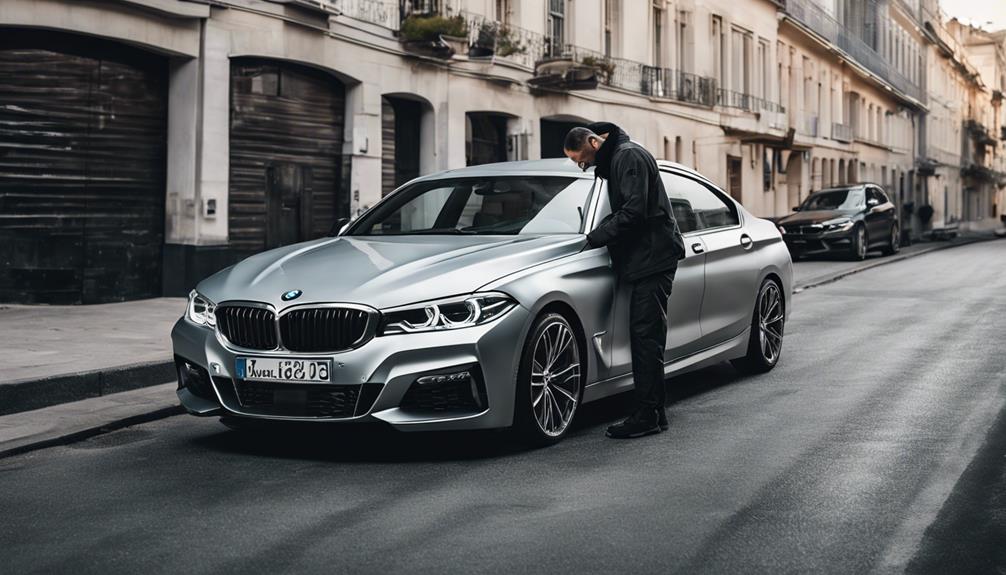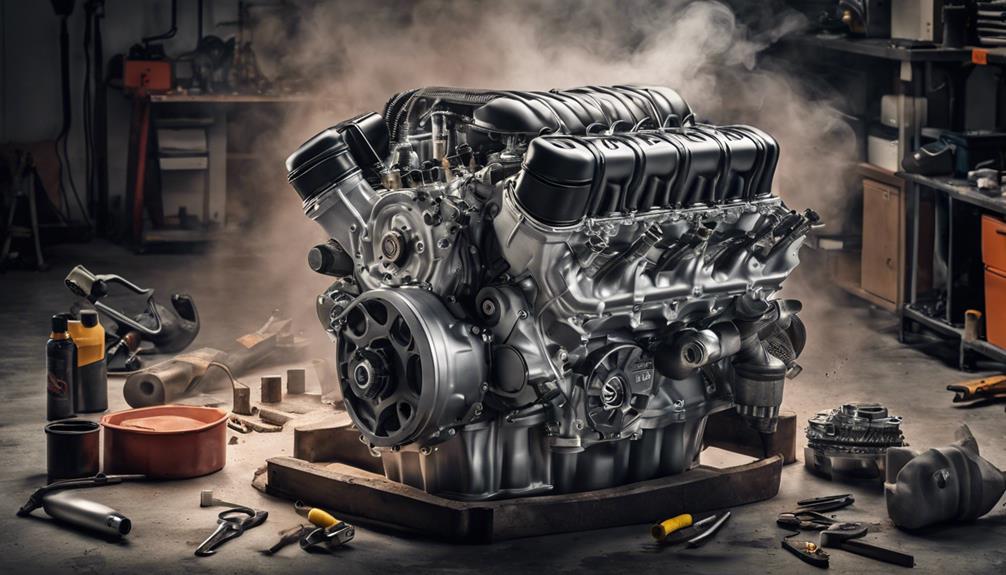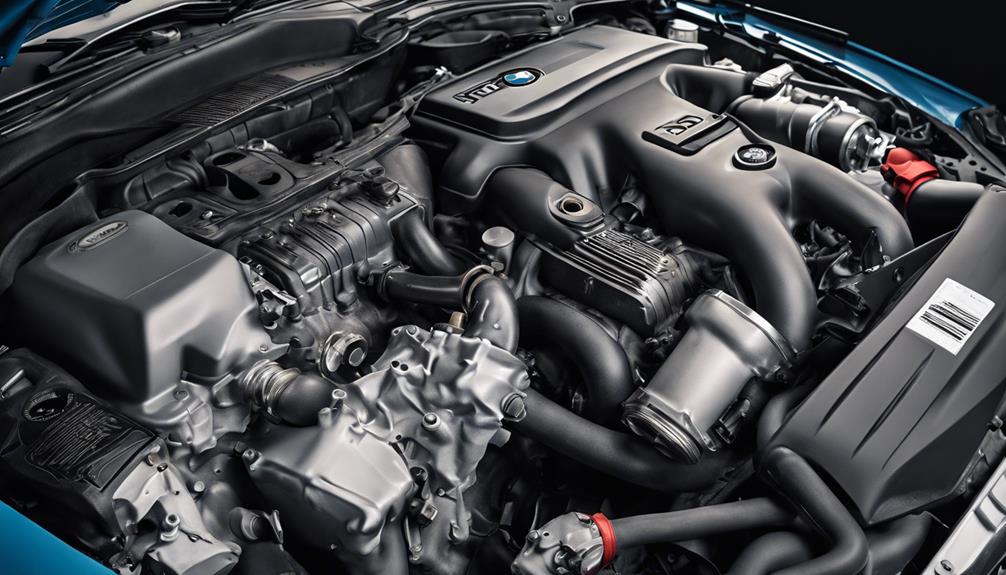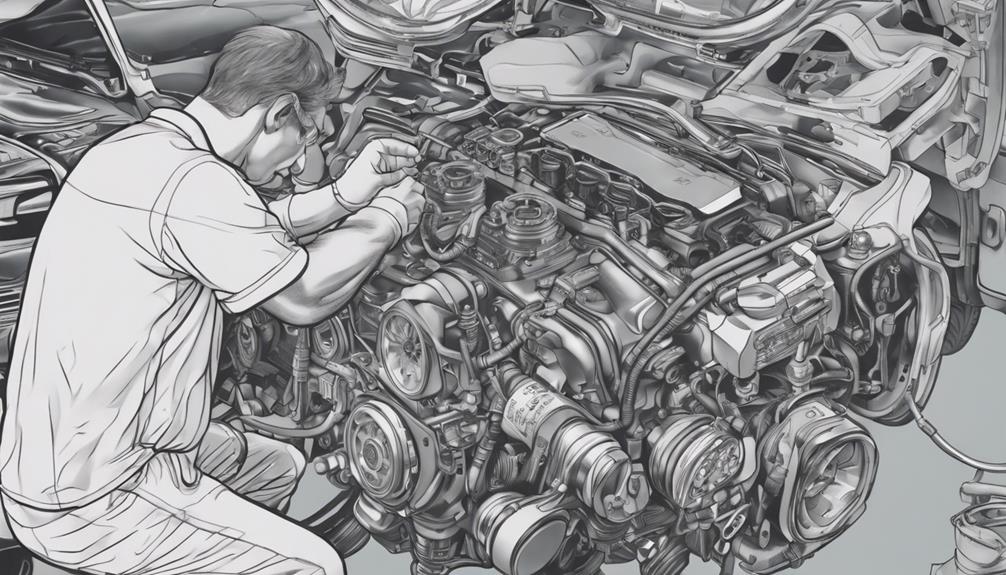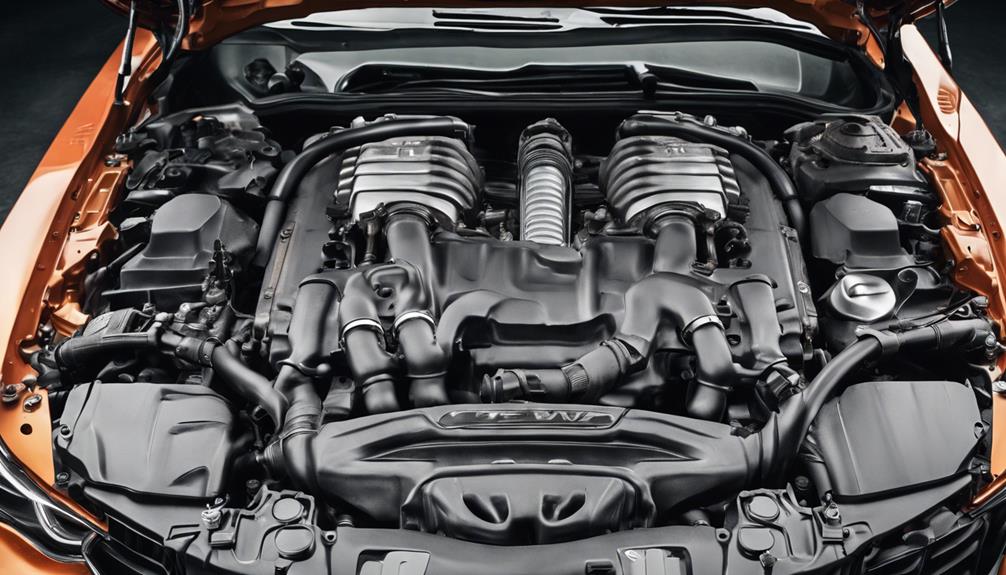When considering pre-owned BMWs, you can rely on their dependability like a meticulous Swiss watch, blending performance and durability for the long haul. The advanced engine technology and sleek power delivery guarantee an exhilarating driving experience. With a focus on efficient powertrains and luxurious interiors, BMWs excel in balancing performance and comfort. Despite potential maintenance costs, BMW's reputation for longevity and precision engineering sets them apart in the luxury market. If you want to learn more about BMW's dependability compared to other brands and tips for ensuring long-term reliability, explore further into the factors influencing their enduring performance.
Key Takeaways
- BMW has a reputation for reliability exceeding 200,000 miles.
- Consumer Reports and J.D. Power rank BMW high in reliability.
- Regular maintenance, detailed service history, and genuine parts enhance longevity.
- BMW outperforms luxury competitors like Porsche and Mercedes-Benz.
- Following maintenance schedules and using OEM parts ensure BMW reliability.
Engine Performance of Used BMWs
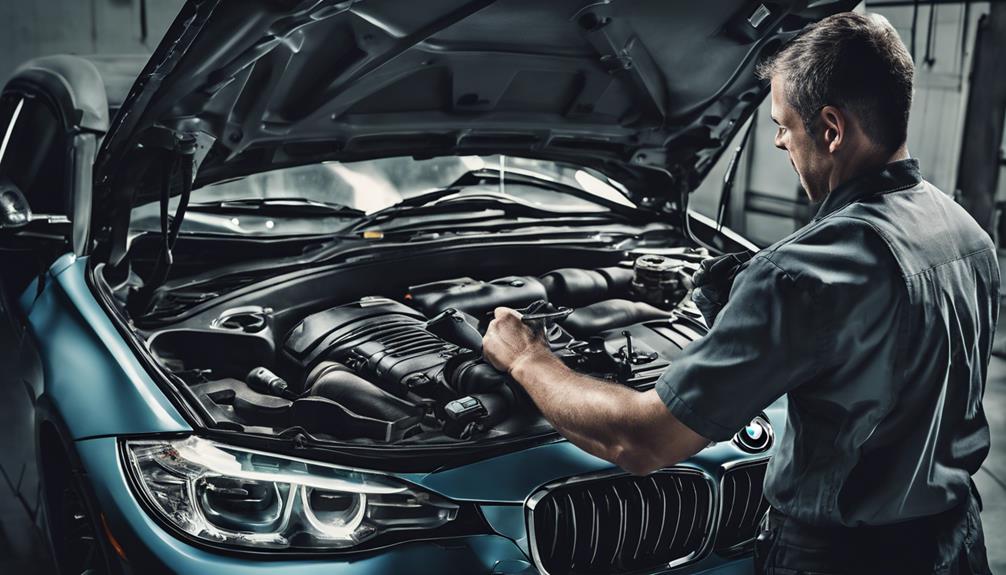
When considering the engine performance of used BMWs, it becomes evident that their high-strung engines offer a remarkable balance of power and precision. These engines aren't just powerful; they're engineered to provide a driving experience that's both thrilling and responsive. Whether you opt for a 3 Series, 5 Series, or even an M model, each specific BMW model brings its unique flair to the table. Before making a purchase, diving into detailed research about the engine performance of the specific BMW model you're eyeing is vital.
BMW has a reputation for incorporating advanced engine technologies into their vehicles, ensuring not only impressive power but also efficient fuel consumption. The smooth power delivery of BMW engines is something that sets them apart from the competition. So, when you're on the hunt for a used BMW, remember that each model has its own personality under the hood. Be sure to do your homework to find the perfect balance of power and efficiency for your driving needs.
Fuel Economy Considerations
Consider the competitive fuel economy ratings of BMW models, showcasing above-average efficiency in their respective classes. BMW's commitment to fuel efficiency is evident through technologies like turbocharging and direct injection, enhancing the overall efficiency of their used vehicles. The EfficientDynamics program further underscores BMW's dedication to improving fuel economy without compromising the driving experience. Additionally, some BMW models are equipped with hybrid powertrains, seamlessly blending electric motors with traditional engines to achieve peak fuel efficiency. For those seeking a balance between performance and fuel economy, certain BMW models offer fuel-efficient diesel engine options, providing a compelling choice for drivers looking to maximize efficiency without sacrificing power. This diverse range of fuel-efficient technologies demonstrates BMW's innovative approach to enhancing the overall sustainability of their vehicles while delivering a dynamic driving experience.
| Fuel Economy Features | Description |
|---|---|
| Turbocharging | Enhances engine efficiency |
| Direct Injection | Improves fuel delivery precision |
| EfficientDynamics | Focuses on balancing performance and efficiency |
| Hybrid Powertrains | Combines electric and traditional engines |
Interior Comfort and Materials
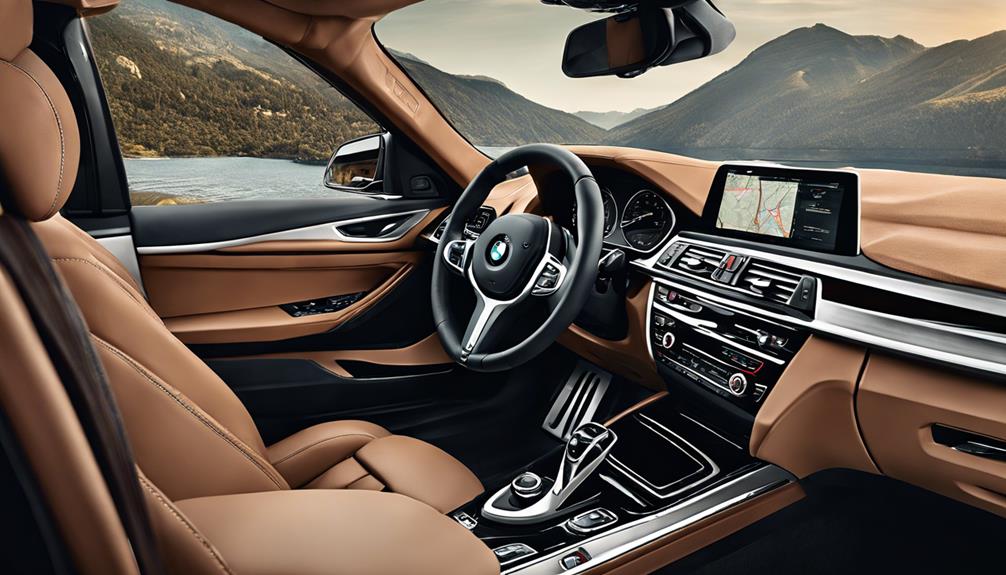
Immerse yourself in the lavish embrace of BMW's renowned interior comfort and exquisite materials, elevating your driving experience to a realm of luxury and sophistication. BMW's luxury interiors are a proof of their dedication to providing a premium driving experience. The use of premium materials such as high-quality leather, fine wood trim, and modern technology enhances the elegant design of the interior, enveloping you in comfort and style.
The meticulous attention to detail in a BMW's interior is apparent in every aspect, from the perfectly stitched leather seats to the sleek dashboard layout. The combination of luxury materials and ergonomic design elements creates a harmonious space that caters to both your aesthetic sensibilities and practical needs. Whether you're cruising down the highway or stuck in city traffic, the interior of a BMW ensures that every moment spent behind the wheel is a pleasurable one.
In a BMW, interior comfort isn't just a feature – it's a lifestyle that transforms your daily commute into a luxurious experience.
Maintenance Costs and Special Parts
Maintaining a used BMW can hit your wallet hard with its expensive parts and specialized components. From premium gasoline to high-quality tires, these special parts can quickly add up in maintenance costs.
Be prepared for the higher labor fees that come with servicing a luxury vehicle like a BMW, as they can considerably impact your overall maintenance budget.
Costly BMW Repairs
Exploring the realm of BMW ownership inevitably leads to encountering the truth of costly repairs, especially when considering maintenance expenses and the need for unique components. BMW repairs can be quite pricey due to the high-end parts and specialized labor required.
Maintenance costs for BMWs are elevated compared to average cars because of the luxury brand's standards. The special components needed, such as imported parts and high-quality tires, contribute greatly to the expensive repairs for BMWs.
Labor costs for BMW repairs are also higher due to the specialized knowledge and skills needed for the brand. BMW owners should be prepared to budget for premium gasoline, synthetic oil changes, and specialized diagnostic systems to ensure proper maintenance of their vehicles.
Specialty Parts Availability
For owners of pre-owned BMWs, finding specialty parts for maintenance can present a significant challenge due to their elevated cost and limited availability compared to standard components. Authentic OEM parts are often recommended to guarantee quality and compatibility with your BMW. These specialty parts, including elements like sensors, control modules, and unique engine parts, may not be as easily accessible as parts for more common vehicles, adding to the overall maintenance costs. Additionally, using high-quality gasoline and top-tier tires further contribute to the expenses of owning a used BMW. Synthetic oil changes are vital for BMWs, but they also add to the maintenance bill. Investing in these specialty parts and services is necessary to keep your BMW running smoothly, albeit at a premium.
| Specialty Parts | Maintenance Costs |
|---|---|
| Authentic OEM parts | Higher cost |
| Top-quality gasoline | Added expenses |
| Synthetic oil changes | Essential upkeep |
Reputation for Engine Reliability
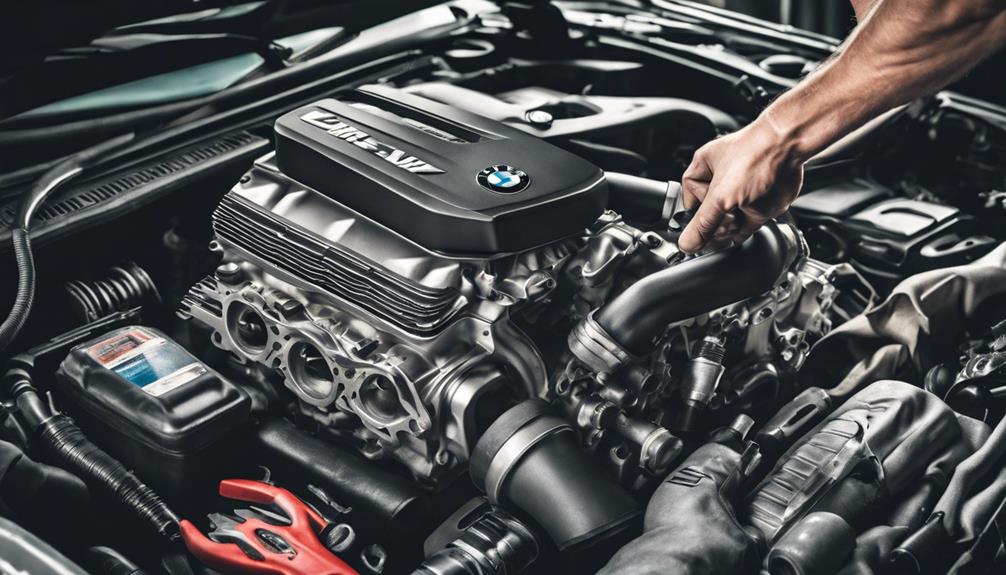
With a legacy built on precision engineering and relentless innovation, BMW has earned a distinguished reputation for its engine reliability. When it comes to BMW engines, reliability is at the forefront, making them a top choice for many drivers.
- Longevity: BMW engines are designed to go the distance, often surpassing 200,000 miles when properly maintained. This longevity speaks to the durability and robustness of these powertrains.
- Performance: Whether it's the smooth power delivery of the inline-six engines or the exceptional power output of the BMW M engines, performance is a hallmark of BMW powertrains. These engines offer a thrilling driving experience without compromising on reliability.
- Overall Reputation: BMW engines are lauded for their balance of power, efficiency, and longevity. This reputation has solidified BMW as a go-to brand for those seeking a blend of performance and dependability in their vehicles.
Retained Value of Used BMWs
When considering the retained value of used BMWs, it's important to compare their resale value against other luxury brands to gauge their investment potential accurately.
Analyzing depreciation rates over time can provide insights into the long-term value retention of BMW models, shedding light on their market performance.
Understanding current market demand trends for used BMWs can help you make informed decisions when it comes to buying or selling, ensuring you maximize your investment returns.
Resale Value Comparison
Used BMWs prove their reliability through their remarkable retention of value, outshining many other luxury brands in the resale market. When comparing resale values, BMWs stand out due to their strong performance despite initial depreciation. Here's why choosing a used BMW could be a smart move:
- Resale Value Strength: BMWs hold their value better than most luxury brands.
- Depreciation Advantage: Compared to economy brands, luxury vehicles like BMW depreciate around 30-40% less when used.
- Maintenance Costs Influence: Although high maintenance costs may impact resale value, the overall robust retention of BMWs makes them an appealing option for saving money while enjoying luxury.
Depreciation Rates Analysis
Around three-quarters of their original value is retained by used BMWs after 3 years, showcasing their strong depreciation rates within the luxury vehicle market.
When looking at specific models, the BMW 5 Series stands out by retaining 58.2% of its value after 3 years, surpassing the industry average.
Similarly, the BMW X3 maintains an impressive 57.3% of its value, highlighting its strong resale value.
For those eyeing the BMW 4 Series, it retains 55.8% of its value after 3 years, making it a promising investment.
Even the BMW 3 Series, with 54.2% retained value after 3 years, upholds solid depreciation rates.
These figures underline the allure of BMWs regarding resale value and depreciation rates.
Market Demand Trends
The sustained desirability of used BMWs is evident in the strong market demand trends, reflecting their retained value in the luxury vehicle segment. When considering the retained value of a used BMW, factors such as age, mileage, and maintenance history play an important role in determining its resale worth. Here's why BMWs continue to hold their value well:
- Model Variability: Different BMW models retain value differently based on their performance, features, and market demand.
- Meticulous Maintenance: Well-documented service records and regular upkeep can positively impact the resale value of a used BMW.
- Appeal Across Age: BMWs from various age brackets can still command good resale prices due to their timeless design and engineering excellence.
Understanding these facets can help you make informed decisions when considering a used BMW purchase or sale.
Common Maintenance Challenges
Facing an array of common maintenance challenges, BMW owners often find themselves maneuvering through a landscape of intricate repairs and troubleshooting. Engine cooling system issues such as water pump failures and coolant leaks frequently plague used BMWs, necessitating timely intervention to prevent overheating and engine damage.
The CCV system and vacuum leaks pose additional hurdles, requiring meticulous attention to detail for proper maintenance. Oil leaks, often stemming from gasket failures, and fuel pump/injector problems add to the list of common issues owners may encounter, demanding proactive measures to guarantee peak performance.
Additionally, the sophisticated electrical systems in BMW models can be prone to malfunctions, necessitating specialized expertise for diagnosis and repair. Emphasizing regular maintenance routines is vital in addressing these challenges and preempting potential issues, underscoring the significance of diligent care to uphold the reliability of your used BMW.
Reliability Comparison With Other Brands

Consider BMW's reliability compared to other brands through a lens of data-driven assessments and consumer insights, shedding light on its standing in the automotive market. When pitted against its competitors, BMW holds its ground in the domain of reliability, surpassing many luxury brands. Here are some key points to ponder:
- Consumer Reports Recognition: In 2018, Consumer Reports ranked BMW as the 8th most reliable brand, showcasing the company's commitment to producing dependable vehicles.
- J.D. Power Endorsement: A 2019 study by J.D. Power found BMW to be above the industry average with regard to reliability, reinforcing the brand's reputation for quality.
- Outperforming Luxury Competitors: BMW outshined luxury competitors like Porsche and Mercedes-Benz in reliability, positioning itself as a strong contender in the luxury vehicle segment.
When considering a luxury vehicle, BMW's reliability track record stands out as a compelling reason to choose one of their models. Don't just take our word for it; let the data speak for itself when making your next automotive investment.
Factors Influencing Longevity
When it comes to the longevity of your used BMW, maintenance plays a crucial role. Keeping up with routine servicing can greatly impact the reliability of your vehicle.
Mileage, upkeep, and a detailed service history are key factors that influence how long your BMW will last.
Maintenance Impact on Reliability
To ensure the longevity and reliability of a used BMW, consistent and meticulous maintenance practices are paramount. Here are three important factors influencing the maintenance impact on reliability:
- Regular Maintenance: Engaging in routine tasks like oil changes, fluid checks, and tune-ups is essential for upholding the reliability of your used BMW.
- Manufacturer's Recommended Schedule: Adhering to the maintenance schedule provided by the manufacturer can greatly impact the longevity and reliability of your BMW.
- Genuine OEM Parts: Opting for genuine OEM parts during repairs and replacements can play a crucial role in maintaining the reliability of your used BMW. Remember, using quality parts is like giving your BMW a badge of honor, ensuring its continued dependability.
Mileage and Upkeep
Securing the longevity of your used BMW involves closely monitoring mileage and maintaining diligent upkeep practices to maximize its lifespan. Consistently driving an average of 13,500 miles per year can considerably extend your BMW's lifespan to an impressive 10-15 years. Regularly following recommended maintenance schedules and using authentic OEM parts for repairs are key factors in keeping your BMW reliable. Conducting thorough inspections between service intervals ensures that any potential issues are caught early, preventing costly repairs down the road. By staying proactive with your BMW's upkeep, you not only increase its longevity but also maintain its performance and value over time.
| Factors Influencing Longevity | Tips for Upkeep |
|---|---|
| Monitoring Mileage | Drive an average of 13,500 miles/year |
| Maintenance Schedules | Follow recommended schedules |
| Authentic OEM Parts | Use genuine parts for repairs |
| Service Intervals | Conduct regular inspections |
Service History Importance
In evaluating used BMWs for reliability and longevity, a documented service history stands as a critical indicator of the vehicle's care and maintenance. When considering a pre-owned BMW, the maintenance records provide valuable insights into the car's upkeep and potential issues. Here's why service history is of utmost importance:
- Maintenance Records: Regular service intervals reflect the owner's commitment to keeping the BMW in top condition.
- Condition Evaluation: Service history helps in evaluating the overall health and reliability of the used BMW.
- Future Predictions: Understanding the maintenance records allows buyers to anticipate and budget for future maintenance needs accurately.
Having access to detailed service records can make a significant difference in the reliability and longevity of your used BMW.
Consumer Satisfaction and Reviews
When considering consumer satisfaction and reviews of used BMWs, it's important to explore the data from reputable sources like Consumer Reports, J.D. Power, and iSeeCars to make an informed decision on your purchase.
Consumer Reports ranked BMW as the 8th most reliable brand in 2018, showcasing its dedication to quality. J.D. Power's 2019 study placed BMW above the industry average, highlighting its consistent performance. Additionally, iSeeCars listed the BMW M6 among the Longest-Lasting Sports Cars, further solidifying the brand's reputation for durability.
BMW has outperformed luxury competitors like Porsche and Mercedes-Benz in reliability, making it a compelling choice for buyers seeking longevity. To confirm you select the most dependable option, research specific BMW models for their reliability ratings before making a final decision.
Tips for Ensuring Used BMW Reliability
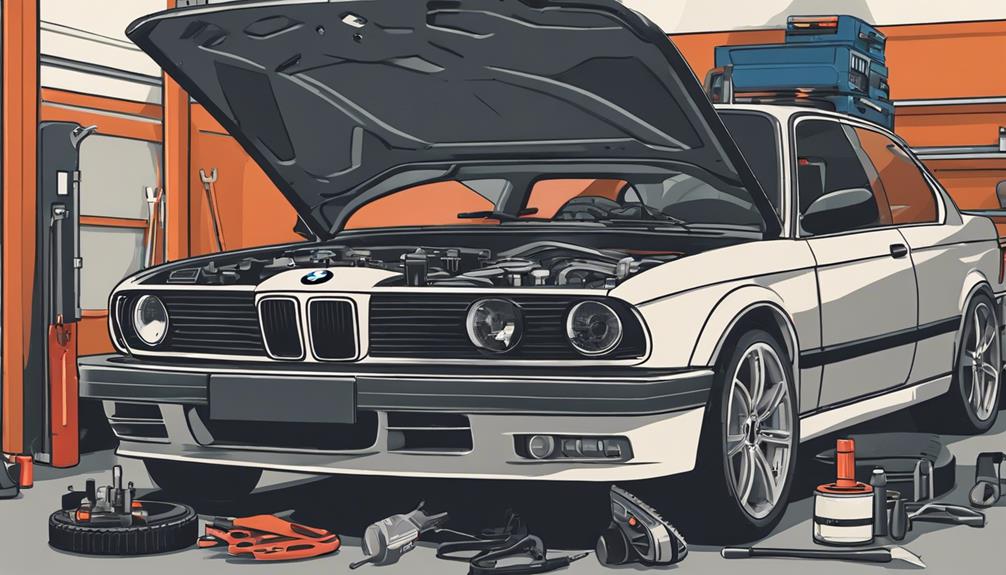
To improve the reliability of a pre-owned BMW, prioritizing regular maintenance and repairs is essential for peak performance and longevity. When it comes to ensuring your pre-owned BMW runs smoothly and reliably, here are some tips to keep in mind:
- Follow the recommended maintenance schedule: Adhering to the manufacturer's recommended maintenance schedule is vital in maintaining the reliability of your pre-owned BMW. Regular servicing can help prevent potential issues from escalating and guarantee that your vehicle continues to perform at its best.
- Use genuine OEM parts for repairs: Opting for genuine Original Equipment Manufacturer (OEM) parts when repairs are needed can greatly enhance the reliability of your pre-owned BMW. OEM parts are specifically designed to fit your vehicle, ensuring top performance and longevity.
- Conduct regular inspections: In addition to scheduled maintenance, conducting regular inspections between service intervals can help identify any potential issues early on. This proactive approach can help address problems before they become more significant, contributing to the overall reliability of your pre-owned BMW.
Frequently Asked Questions
Are Second Hand BMW Cars Reliable?
When considering second-hand BMW cars, remember their solid reputation for reliability. Research specific models for individual ratings, ensuring you make an informed choice. Enjoy the luxury and performance of a BMW with confidence.
Are Used BMWs Expensive to Maintain?
Maintaining a used BMW can be pricey due to high-end parts, premium fuel requirements, and specialized labor. Costs escalate with imported components, complex electronics, and specialized mechanics. Be prepared for the investment.
How Long Can a Used BMW Last?
With proper care, a used BMW can last 150,000 to 200,000 miles, potentially up to 10-15 years. Diligent maintenance, timely repairs, and using genuine parts are key. Regular cleaning and inspections also help extend its life.
What Are the Disadvantages of Buying a Used Bmw?
When buying a used BMW, you'll face higher insurance and maintenance costs, along with challenges finding parts for older models. Premium gasoline and intricate electronics contribute to the overall expenses. Consider these drawbacks carefully.
Conclusion
To sum up, when considering the dependability of pre-owned BMWs, it's crucial to take into consideration factors such as:
- Engine performance
- Fuel efficiency
- Maintenance expenses
- Overall standing
While BMWs may have a reputation for being luxurious vehicles, their dependability can vary depending on various factors. By staying on top of maintenance and selecting a well-maintained pre-owned BMW, you can guarantee a reliable driving experience that lives up to the brand's prestige.





